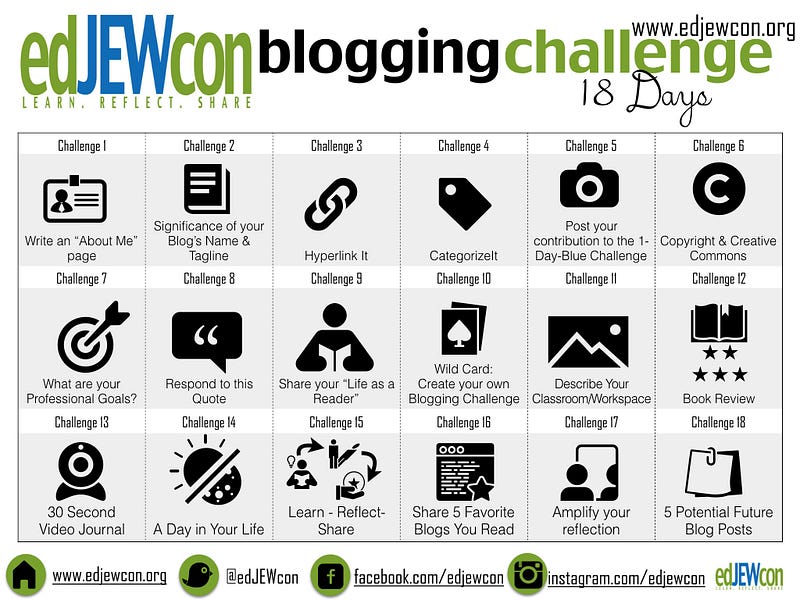[Cross-posted from an interview I did for Prizmah’s December Newsletter.]
10 Innovative Ideas for Any School or Grade Level
by Dr. Jon Mitzmacher, Executive Director of the Schechter Day School Network and VP of Innovation, Prizmah: Center for Jewish Day Schools
All schools have different capacities for incorporating innovation into their curricula; however, using new teaching methods and formats for teaching keep the classroom fresh, appeal to learners of all levels, and contribute to a sense of fun in the educational environment. So we quizzed Dr. Jon Mitzmacher about how all schools can infuse more innovation into their students’ daily experience.
Mitzmacher recommended these ten ideas, noting that almost all of them could be applied to any subject or grade level with minimal adjustment. He also pointed to the importance of having what educator George Couros refers to as “the innovator’s mindset” — that teachers and administrators are willing to take chances, learn from failure, have a growth mindset, and a culture that supports innovative approaches.
You may already be engaged in some of these strategies — others may seem like a stretch; but no matter where your school is in terms of innovation, you’ll find something on this list to inspire you. (And two of these ideas relate directly to content we are featuring at #Prizmah17: The Power of Story. So read on, and don’t forget to register today!
1) Escape the Room
Escape rooms are all the rage these days for adults, challenging groups to work together — and use their different skills — to complete the game. Mitzmacher says that schools are experimenting with a classroom version of the escape-the-room concept, designing the experience for the specific class and their curriculum, with clues based on the content they are learning. “It’s a fun way to get kids engaged in a subject,” said Mitzmacher, noting that the concept can be used either as an introduction to certain material, or as a final exam after students have studied it. (Conference fun fact: Breakout EDU (breakoutedu.com) designs escape-the-room kits for classrooms, and they will be at tjos year’s conference in Chicago! You can buy kits through them, or they will tell you all the tools you’ll need to buy to create your own kit. )
2) Visual Bingo
In a format created by master innovator Darren Kuropatwa, teachers can create their own bingo cards that ask students to photograph various things. In social-media-savvy classrooms, students can also use hashtags to tag related posts. This creates a “visual bingo,” which can be tailored to holidays, events or curricula, and which is a way to teach or expand digital skills. (Conference fun fact: Darren will be present in the Playground, so be sure to stop by for a round of hashtag/Twitter Bingo — make sure to join us there for a live experience of this innovative approach).
3) “Fakebook”
Available at Classtools.net/FB, “Fakebook” allows teachers and students to create imaginary profile pages for study purposes. This can teach students how to use Facebook responsibly, said Mitzmacher, and also permits teachers and students to create profiles for Biblical characters, like the ones in the Hanukkah story.
4) Skype-ortunities
Mitzmacher said that many schools are always on the lookout for new “Skypeortunities,” opportunities to connect with other schools and organizations via Skype. He further noted that this can be a great way to engage and give ownership to students, encouraging them to invite an author of a book they read, a scientist, or a sister school in Israel/or other Jewish community or organization to a Skype interaction.
5) Digital Learning Farm
Alan November, educational innovator, shares the idea of a digital learning farm: a model in which every student has a job to play. All jobs — whether it’s photographer, videographer, notetaker, IT coordinator, or others — are essential to the success of the classroom.
6) “Livestreaming Something….Anything”
Mitzmacher points to livestreaming as an invaluable opportunity “to show people what you want them to see” about the classroom, whether it’s parents who work, grandparents, or other relatives who don’t live in the area. He notes that it’s also an opportunity to engage in tikkun olam projects, like teaching how to be in relationship with people who are homebound.
7) Flipping the Classroom
In this concept — which is already in process in many schools, Mitzmacher notes — teachers send new material with students to learn at home, and then at school check for how well they understood the content. Instead of taking class time to introduce basic material, teachers and students can spend their classroom time going deeper into the material.
8) Mini Makers Space Challenge
Mitzmacher says that some schools have expensive Makers Spaces set up, but those who don’t can still create a smaller version in the classroom. Teachers can collect tools or stuff to play with and challenge students to solve a problem and to think about something in a different way. (For example, around Hanukkah, students could use tools to create the best possible Hanukkiyah prototype.)
9) Blogs and Blogging Challenges
If a classroom doesn’t have a blog, start one. Those who are already set up with blogs can participate in a blogging challenge (a sample is available on EdJewCon). Blogging challenges can include everything from “describe your classroom” to learning how to hyperlink or creating and uploading a 30-second video journal.

10) Speed Geeking
Mitzmacher pronounced this method a “great way for a class to showcase its skills to parents or to the school or other kids.” Children have ten-minute bursts to display their skills to visiting guests, then rotate around the room. Skills may include: how to use Google Docs for organization or using the iPad for photography.
